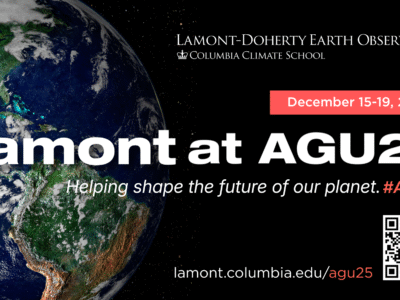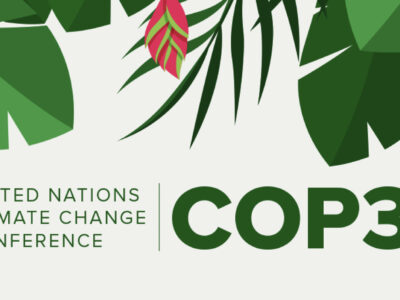 Earlier today it was announced that Wallace S. Broecker, Newberry Professor of Earth and Environmental Sciences at Columbia University, has received the BBVA Foundation Frontiers of Knowledge Award in Climate Change Research. In announcing the award, the jury cited Wally for his seminal research on ocean chemistry and for pioneering the development of Earth System Science as the basis for understanding global climate change, both past and present. In particular, the jury noted his holistic approach to Earth System Science that led him to identify mechanisms of abrupt climate change. Wally’s effort to warn society about the pending risks of greenhouse gas emissions was cited as well and his efforts to communicate with a broad public through his books.
Earlier today it was announced that Wallace S. Broecker, Newberry Professor of Earth and Environmental Sciences at Columbia University, has received the BBVA Foundation Frontiers of Knowledge Award in Climate Change Research. In announcing the award, the jury cited Wally for his seminal research on ocean chemistry and for pioneering the development of Earth System Science as the basis for understanding global climate change, both past and present. In particular, the jury noted his holistic approach to Earth System Science that led him to identify mechanisms of abrupt climate change. Wally’s effort to warn society about the pending risks of greenhouse gas emissions was cited as well and his efforts to communicate with a broad public through his books.
This award, following close on the heels of the Balzan Prize last year, and the Crafoord Prize in 2006, illustrates the global recognition that Wally receives for his tremendous impact on the field of climate change research.
Wally has been interested in climate change since his own work as a student took him to the arid southwestern U.S., where paleo shore lines standing high above the levels of modern desert lakes and dry playas offer dramatic testimony to the pronounced changes in climate that have occurred throughout the geologically recent past. That interest has driven Wally’s inquisitive mind to seek solutions to climate puzzles ranging from the causes of abrupt climate change in the past to the consequences in the foreseeable future of the rising concentrations of anthropogenic greenhouse gases. Concerns about future climate change led Wally to publish last year, along with co-author Rob Kunzig, a provocative book entitled “Fixing Climate: What Past Climate Changes Reveal About the Current Threat–and How to Counter It”, in which he issues a call to arms to implement measures of mitigation and adaptation while the opportunity to avoid some of the worst potential consequences of climate change remains within society’s reach.
However, Wally’s research has not focused exclusively on climate change. When I was a student in chemical oceanography Wally was the premier scientist in the field, authoring two text books (Chemical Oceanography, 1974; Tracers in the Sea, 1982) that educated a generation of chemical oceanographers in addition to countless research papers. In Tracers in the Sea, Wally presented a comprehensive synthesis of results of the GEOSECS program, for which he served as an intellectual leader. “Tracers” provided a global view of the marine biogeochemical cycles of carbon and nutrients, noting the key roles played by marine biology and by ocean circulation. It also established the powerful benefits of using chemical tracers to probe, identify, and quantify the rates of marine biogeochemical cycles.
Many years ago, shortly after I became a colleague of Wally at Lamont-Doherty Earth Observatory, he revealed to me his motivation for investing years of effort in the study of ocean circulation and biogeochemistry. Climate change was always in the back of his mind, but he realized that he would need a thorough understanding of modern ocean processes to interpret accurately the paleoclimate information recorded in marine sediments and in other geological archives. He noted the value of understanding the processes that shape the distributions in the modern ocean of geochemical tracers that are extracted from sediment archives and used to illuminate environmental conditions in the past. Through his years of study of the chemistry and physics of the ocean, Wally gained unmatched insights into marine biogeochemical cycles and of the forces that drive them. I like to think that this multidisciplinary approach toward investigating the global processes that link the ocean to climate, including the role of the carbon cycle, has contributed to Wally’s success as a climate scientist.
Wally’s philosophical approach to study the modern ocean as a strategy to gain a more accurate understanding of the past continues to serve as a guiding principle shaping the next generation of ocean research. Indeed, one of the three principal themes of the GEOTRACES program, an international study of the marine biogeochemical cycles of trace elements and their isotopes, is: “To understand the processes that control the concentrations of geochemical species used for proxies of the past environment, both in the water column and in the substrates that reflect the water column”. Thus, Wally’s pioneering efforts continue to influence the fields of chemical oceanography and climate change alike, and one can anticipate that future research bridging these disciplines will reveal new insights into the rules that govern the climate machinery of this dynamic planet.
Congratulation to Wally and many thanks for all he has done for Lamont, Columbia and the climate research community. Best wishes for many more years of contributions to climate change research!




In 1993, I had the very good fortune to spend the better part of a month with Dr. Broecker aboard the Maurice Ewing on a cruise from Reykjavik to Woods Hole. Dr. Broecker was and is one of those rare individuals that possesses both an intimate knowledge of the details and an impressive grasp of the larger picture. I learned alot from him on that trip. So, my thanks and congratulations on the award!
Peter Mills
Congratulations on your prestigious new award Wally. I came to hear your talk at the RSA in London when you launched your Fixing Climate book, and was inspired by your story of persistence to raise the alarm on climate change.
If you’re ever in London again you’ll find a warm reception…. so long as the conveyor belt hasn’t stopped of course!
best wishes,
Gregor Margetson
Sustainability Consultant
Envido Ltd
http://www.envido.co.uk